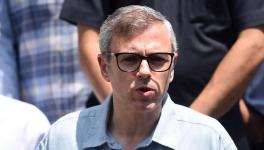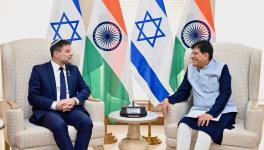In Kashmir, Politicians and Their Families Feel the Sting of Crackdown
Srinagar: The abrogation of Article 370 and bifurcation of Jammu and Kashmir into two union territories has not only hurt the pro-India politicians in the erstwhile state, the mainstream polity in Kashmir today feels ‘disempowered’ as consequent crackdown and detentions continue.
According to official sources, more than 600 people continue to remain under detention or arrest including three former Chief Ministers of the state – Farooq Abdullah, Mehbooba Mufti and Omar Abdullah – and other top leadership and political activists. The number of people detained, other than those associated with the mainstream political parties is much higher, in thousands.
“It is a massive assault on autonomy, integrity and identity of the state. We are trying to voice our concerns for political workers, and we are not even allowed that,” Member of Parliament Justice Hasnain Massoodi (Retd.) told NewsClick. Massoodi is among a handful of politicians who haven’t been put under detention. The MP from Anantnag parliamentary constituency, who entered politics earlier this year after joining National Conference (NC), terms the ongoing crisis as ‘completely unprecedented’ and ‘stressful’. “We tried to meet our party leader Abdullah, but we were not allowed. We made rounds for three consecutive days, but we were not supported,” Massoodi said.
Also read: It’s Andha Kanoon (in J&K). Anyone Can be Arrested: Akbar Lone
The government terms most of these detentions as well as the restriction on movement and the communication blackout as part of ‘preventive measures’ to prevent any revolt against the decision to abrogate the special status of J&K.
Like Massoodi, another MP from Baramulla constituency Akbar Lone has also not been arrested. Lone told NewsClick the current crackdown on political leadership is ‘unexpected’. Massoodi and Lone are the only politicians from National Conference who have been able to visit their Nawa e Subh party headquarters in Srinagar. “We have no contact with the people nor with any our workers and activists,” Lone says.
Both the members of parliament also lament about the lack of communication. “The police and administrative officials have been provided with special phone numbers. But, not us. We could have regulated their use as well,” Massoodi points out. A party worker says he is witnessing the party headquarters deserted for the first time since he joined, the offices are locked as all the office bearers are serving ‘detention’. Most of them have been lodged inside a hotel which houses multiple convention centres and now serves as a major detention centre in Srinagar.
The Sher-e-Kashmir International Convention Centre (SKICC), where more than thirty politicians from several mainstream political parties are currently incarcerated, is heavily guarded by police and security forces. Lone’s son, Hilal, is among those detained inside SKICC. The centre, surrounded by the scenic Dal lake on three sides, is out of bounds for even relatives and friends and no one is permitted to meet the leaders without a written permission from the district magistrate. Even the close family members lament they are left in lurch due to the lack of easy access to the detained.
Shabnam Lone, a prominent lawyer and sister of People’s Conference leader Sajad Lone, says she had to witness her mother’s plight as she was not allowed to meet her son. “This is very unfortunate that we are not allowed to meet our family members. I couldn’t see my mother, who is on medication, in such a despair at such an age,” Shabnam says. The parents of Deputy Mayor Sheikh Imran have been visiting the Deputy Commissioner’s office in Srinagar for four consecutive days. “So far we have not received permission. Even though we met him once after he was detained, we need to check on him again,” Imran’s father Sheikh Mushtaq told NewsClick.
Like Imran’s family, the family of NC’s senior leader and general secretary Ali Muhammad Sagar say they have been trying to get permission to meet him as well for many days now. Sagar is detained at SKICC along with his son Salman Sagar, the party’s youth leader. “I can’t see my grandfather or uncle. We feel there are no rights left in this place,” Yawar Ali says. Ali was also waiting for permission, his foot bandaged after a recent foot injury.
Also read: Over 120 Harvard University Faculty, Students Write to Indian Govt Seeking Release of Shah Faesal
The DC office has received more than a dozen applications from the family members of those under detention. Some of the members are visiting from distant places like Pahalgam, 88 km away from Srinagar. “This is very humiliating. We have come all the way to get permission and they tell us to come the next day without realising how difficult it is to travel, especially during restrictions,” the family member of another politician says.
Many politicians have been detained inside their houses. The Gupkar Road in Srinagar is a VIP residential area, called the ‘power street’ of Kashmir, where most of the leaders live including three former chief ministers. Farooq Abdullah has been detained inside his home, his son Omar, however, has been shifted to a nearby guest house turned detention centre.
PDP’s Mehbooba Mufti has also been kept inside another centre. Senior Communist Party of India (Marxist) [CPI(M)] leader MY Tarigami has also been put under house arrest at his Gupkar residence, his home locked from inside. All of them without any access to communication or information. There is no word from the administration on how long these politicians will be kept under detention.
“There may be detentions and there may be releases, it is being reviewed. The process is under a continuous process of evaluation,” senior bureaucrat Rohit Kansal says.
A senior security official says the massive detentions were necessary to maintain ‘public order’. “We have been successful in avoiding any massive eruption or casualty on the ground,” he said. In Srinagar alone, there are half a dozen such detention centres, according to officials. The number is much higher across the Valley in all the ten districts.
Also read: Current Clampdown in Kashmir a Prelude to Dark, Uncertain Future
The arrests of these politicians have evoked a mixed response on the ground as many people consider it as the only good outcome of the present crisis. “They should also feel the sting of draconian laws which we have been facing so long,” a resident of Soura told NewsClick.
Many others called it another ‘demonetisation’ by the central government. “Like the currency, the government has now demonetised the politicians of Kashmir,” a family member of another incarcerated politician said.
Get the latest reports & analysis with people's perspective on Protests, movements & deep analytical videos, discussions of the current affairs in your Telegram app. Subscribe to NewsClick's Telegram channel & get Real-Time updates on stories, as they get published on our website.
























